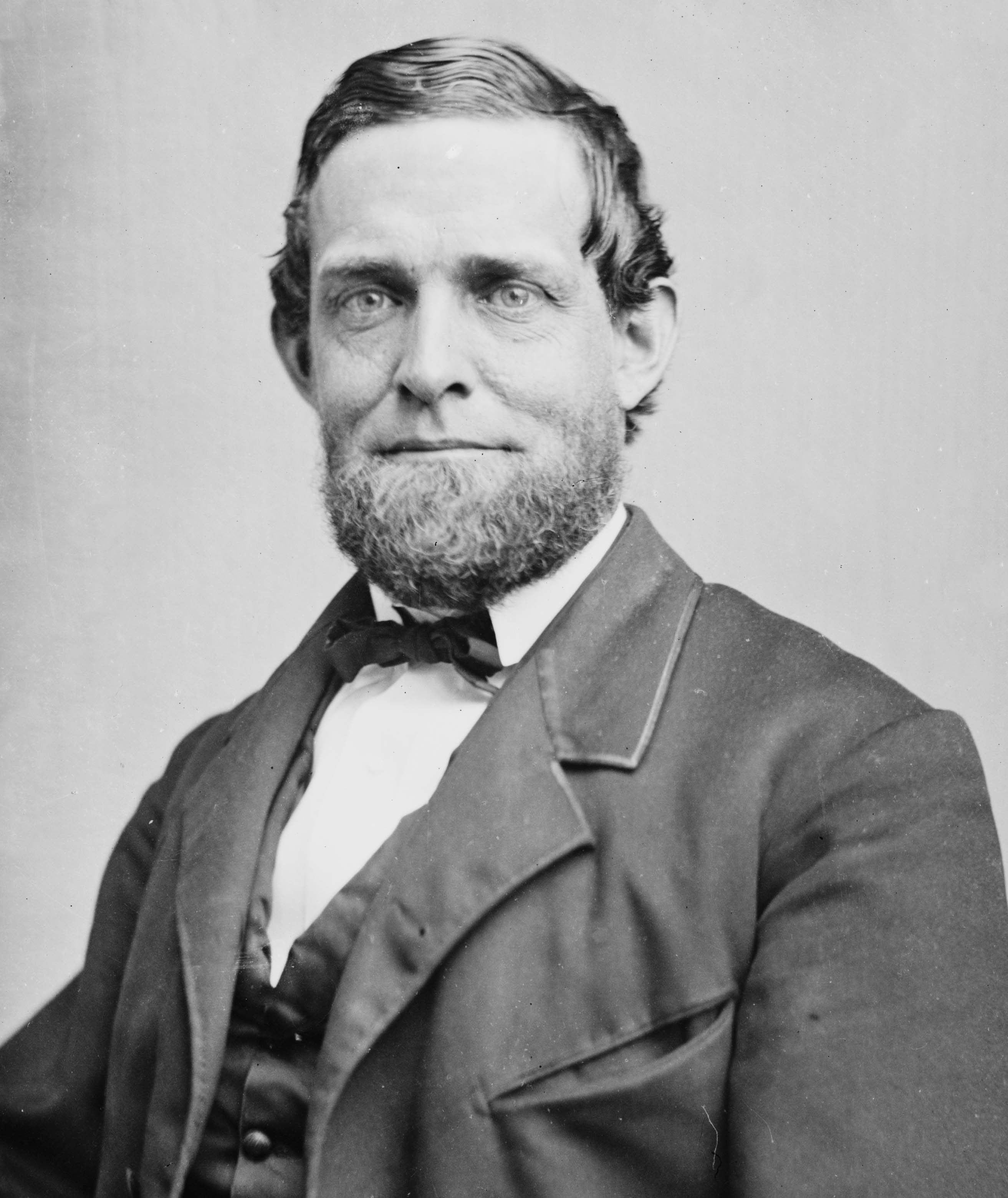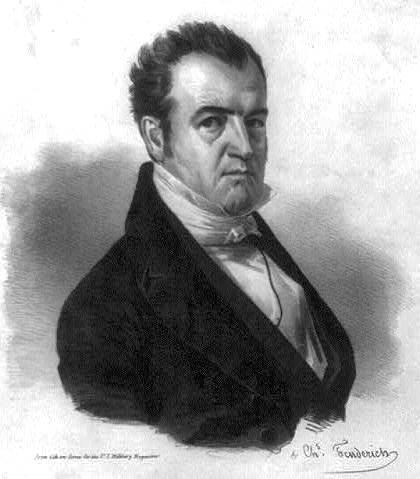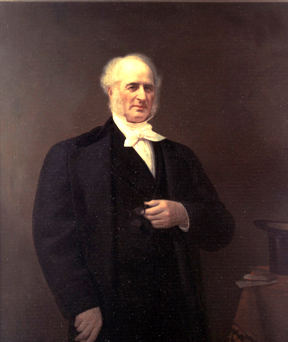|
Jacob Golladay
Jacob Shall Golladay (January 19, 1819 – May 20, 1887) was a 19th-century politician from Kentucky. He served in the Kentucky House of Representatives and Senate, followed by two terms as a United States representative for the 3rd congressional district (1867 to 1870). His brother Edward Isaac Golladay also became an attorney and served as a US Congressman from Tennessee. Early life Jacob Golladay was born in 1819 in Lebanon, Tennessee. His father Isaac was a descendant of French Huguenots who emigrated to Virginia about 1700 from Germany after escaping religious persecution against Protestants in France. The spelling of the family name is likely an anglicised version of the French surname "Gallaudet". His mother was of German ancestry, with immigrant ancestors who arrived later in the 18th century. In 1815 the Golladay family moved to Lebanon, Tennessee, where both Jacob and his younger brother Edward were born. After attending public school, Jacob moved in 1838 to Logan C ... [...More Info...] [...Related Items...] OR: [Wikipedia] [Google] [Baidu] |
Kentucky
Kentucky ( , ), officially the Commonwealth of Kentucky, is a state in the Southeastern region of the United States and one of the states of the Upper South. It borders Illinois, Indiana, and Ohio to the north; West Virginia and Virginia to the east; Tennessee to the south; and Missouri to the west. Its northern border is defined by the Ohio River. Its capital is Frankfort, and its two largest cities are Louisville and Lexington. Its population was approximately 4.5 million in 2020. Kentucky was admitted into the Union as the 15th state on June 1, 1792, splitting from Virginia in the process. It is known as the "Bluegrass State", a nickname based on Kentucky bluegrass, a species of green grass found in many of its pastures, which has supported the thoroughbred horse industry in the center of the state. Historically, it was known for excellent farming conditions for this reason and the development of large tobacco plantations akin to those in Virginia and North Carolina i ... [...More Info...] [...Related Items...] OR: [Wikipedia] [Google] [Baidu] |
Virginia
Virginia, officially the Commonwealth of Virginia, is a state in the Mid-Atlantic and Southeastern regions of the United States, between the Atlantic Coast and the Appalachian Mountains. The geography and climate of the Commonwealth are shaped by the Blue Ridge Mountains and the Chesapeake Bay, which provide habitat for much of its flora and fauna. The capital of the Commonwealth is Richmond; Virginia Beach is the most-populous city, and Fairfax County is the most-populous political subdivision. The Commonwealth's population was over 8.65million, with 36% of them living in the Baltimore–Washington metropolitan area. The area's history begins with several indigenous groups, including the Powhatan. In 1607, the London Company established the Colony of Virginia as the first permanent English colony in the New World. Virginia's state nickname, the Old Dominion, is a reference to this status. Slave labor and land acquired from displaced native tribes fueled the ... [...More Info...] [...Related Items...] OR: [Wikipedia] [Google] [Baidu] |
Kentucky Whigs
Kentucky ( , ), officially the Commonwealth of Kentucky, is a state in the Southeastern region of the United States and one of the states of the Upper South. It borders Illinois, Indiana, and Ohio to the north; West Virginia and Virginia to the east; Tennessee to the south; and Missouri to the west. Its northern border is defined by the Ohio River. Its capital is Frankfort, and its two largest cities are Louisville and Lexington. Its population was approximately 4.5 million in 2020. Kentucky was admitted into the Union as the 15th state on June 1, 1792, splitting from Virginia in the process. It is known as the "Bluegrass State", a nickname based on Kentucky bluegrass, a species of green grass found in many of its pastures, which has supported the thoroughbred horse industry in the center of the state. Historically, it was known for excellent farming conditions for this reason and the development of large tobacco plantations akin to those in Virginia and North Carolina i ... [...More Info...] [...Related Items...] OR: [Wikipedia] [Google] [Baidu] |
People From Lebanon, Tennessee
A person ( : people) is a being that has certain capacities or attributes such as reason, morality, consciousness or self-consciousness, and being a part of a culturally established form of social relations such as kinship, ownership of property, or legal responsibility. The defining features of personhood and, consequently, what makes a person count as a person, differ widely among cultures and contexts. In addition to the question of personhood, of what makes a being count as a person to begin with, there are further questions about personal identity and self: both about what makes any particular person that particular person instead of another, and about what makes a person at one time the same person as they were or will be at another time despite any intervening changes. The plural form "people" is often used to refer to an entire nation or ethnic group (as in "a people"), and this was the original meaning of the word; it subsequently acquired its use as a plural form of per ... [...More Info...] [...Related Items...] OR: [Wikipedia] [Google] [Baidu] |
1887 Deaths
Events January–March * January 11 – Louis Pasteur's anti-rabies treatment is defended in the Académie Nationale de Médecine, by Dr. Joseph Grancher. * January 20 ** The United States Senate allows the Navy to lease Pearl Harbor as a naval base. ** British emigrant ship ''Kapunda'' sinks after a collision off the coast of Brazil, killing 303 with only 16 survivors. * January 21 ** The Amateur Athletic Union (AAU) is formed in the United States. ** Brisbane receives a one-day rainfall of (a record for any Australian capital city). * January 24 – Battle of Dogali: Abyssinian troops defeat the Italians. * January 28 ** In a snowstorm at Fort Keogh, Montana, the largest snowflakes on record are reported. They are wide and thick. ** Construction work begins on the foundations of the Eiffel Tower in Paris, France. * February 2 – The first Groundhog Day is observed in Punxsutawney, Pennsylvania. * February 4 – The Interstate Commerce Act ... [...More Info...] [...Related Items...] OR: [Wikipedia] [Google] [Baidu] |
1819 Births
Events January–March * January 2 – The Panic of 1819, the first major peacetime financial crisis in the United States, begins. * January 25 – Thomas Jefferson founds the University of Virginia. * January 29 – Sir Stamford Raffles lands on the island of Singapore. * February 2 – ''Dartmouth College v. Woodward'': The Supreme Court of the United States under John Marshall rules in favor of Dartmouth College, allowing Dartmouth to keep its charter and remain a private institution. * February 6 – A formal treaty, between Hussein Shah of Johor and the British Sir Stamford Raffles, establishes a trading settlement in Singapore. * February 15 – The United States House of Representatives agrees to the Tallmadge Amendment, barring slaves from the new state of Missouri (the opening vote in a controversy that leads to the Missouri Compromise). * February 19 – Captain William Smith of British merchant brig ''Williams'' sights Williams ... [...More Info...] [...Related Items...] OR: [Wikipedia] [Google] [Baidu] |
Forty-first Congress
The 41st United States Congress was a meeting of the legislative branch of the United States federal government, consisting of the United States Senate and the United States House of Representatives. It met in Washington, D.C. from March 4, 1869, to March 4, 1871, during the first two years of Ulysses S. Grant's presidency. The apportionment of seats in the House of Representatives was based on the Eighth Census of the United States in 1860. Both chambers had a Republican majority. Major events * March 4, 1869: Ulysses Grant became President of the United States * March 4, 1869: Carl Schurz R-Missouri became the first German American to serve in the United States Senate * May 10, 1869: Golden spike marked the completion of the First transcontinental railroad in Promontory, Utah * December 10, 1869: Wyoming Territory gave women the right to vote, one of the first such laws in the world * February 12, 1870: Utah Territory gave women the right to vote * February 25, 1870: Senato ... [...More Info...] [...Related Items...] OR: [Wikipedia] [Google] [Baidu] |
Fortieth Congress
The 40th United States Congress was a meeting of the legislative branch of the United States federal government, consisting of the United States Senate and the United States House of Representatives. It met in Washington, D.C. from March 4, 1867, to March 4, 1869, during the third and fourth years of Andrew Johnson's presidency. The apportionment of seats in the House of Representatives was based on the Eighth Census of the United States in 1860. Both chambers had a Republican majority. In the Senate, the Republicans had the largest majority a party has ever held. Major events * March 30, 1867: Alaska Purchase * February 24, 1868: Impeachment of Andrew Johnson * May 16, 1868: President Johnson acquitted * May 26, 1868: President Johnson acquitted again * November 3, 1868: 1868 presidential election: Ulysses S. Grant (R) defeated Horatio Seymour (D) * December 25, 1868: President Johnson granted unconditional pardons to all Civil War rebels * January 20, 1869: Elizabeth ... [...More Info...] [...Related Items...] OR: [Wikipedia] [Google] [Baidu] |
Union (American Civil War)
During the American Civil War, the Union, also known as the North, referred to the United States led by President Abraham Lincoln. It was opposed by the secessionist Confederate States of America (CSA), informally called "the Confederacy" or "the South". The Union is named after its declared goal of preserving the United States as a constitutional union. "Union" is used in the U.S. Constitution to refer to the founding formation of the people, and to the states in union. In the context of the Civil War, it has also often been used as a synonym for "the northern states loyal to the United States government;" in this meaning, the Union consisted of 20 free states and five border states. The Union Army was a new formation comprising mostly state units, together with units from the regular U.S. Army. The border states were essential as a supply base for the Union invasion of the Confederacy, and Lincoln realized he could not win the war without control of them, especially Maryla ... [...More Info...] [...Related Items...] OR: [Wikipedia] [Google] [Baidu] |
Edward Everett
Edward Everett (April 11, 1794 – January 15, 1865) was an American politician, Unitarian pastor, educator, diplomat, and orator from Massachusetts. Everett, as a Whig, served as U.S. representative, U.S. senator, the 15th governor of Massachusetts, minister to Great Britain, and United States secretary of state. He also taught at Harvard University and served as its president. Everett was one of the great American orators of the antebellum and Civil War eras. He is often remembered today as the featured orator at the dedication ceremony of the Gettysburg National Cemetery in 1863, where he spoke for over two hoursimmediately before President Abraham Lincoln delivered his famous two-minute Gettysburg Address. The son of a pastor, Everett was educated at Harvard, and briefly ministered at Boston's Brattle Street Church before taking a teaching job at Harvard. The position included preparatory studies in Europe, so Everett spent two years in studies at the University of Gö ... [...More Info...] [...Related Items...] OR: [Wikipedia] [Google] [Baidu] |
John Bell (Tennessee Politician)
John Bell (February 18, 1796September 10, 1869) was an American politician, attorney, and planter who was a candidate for President of the United States in the election of 1860. One of Tennessee's most prominent antebellum politicians,Jonathan Atkins,John Bell" ''Tennessee Encyclopedia of History and Culture'', 2009. Retrieved: October 10, 2012. Bell served in the House of Representatives from 1827 to 1841, and in the Senate from 1847 to 1859. He was Speaker of the House for the 23rd Congress (1834–1835), and briefly served as Secretary of War during the administration of William Henry Harrison (1841). In 1860, he ran for president as the candidate of the Constitutional Union Party, a third party which took a neutral stance on the issue of slavery. and won the electoral votes of three states. Initially an ally of Andrew Jackson, Bell turned against Jackson in the mid-1830s and aligned himself with the National Republican Party and then the Whig Party, a shift that ea ... [...More Info...] [...Related Items...] OR: [Wikipedia] [Google] [Baidu] |
Vanderbilt University
Vanderbilt University (informally Vandy or VU) is a private research university in Nashville, Tennessee. Founded in 1873, it was named in honor of shipping and rail magnate Cornelius Vanderbilt, who provided the school its initial $1-million endowment in the hopes that his gift and the greater work of the university would help to heal the sectional wounds inflicted by the Civil War. Vanderbilt enrolls approximately 13,800 students from the US and over 100 foreign countries. Vanderbilt is classified among "R1: Doctoral Universities – Very high research activity". Several research centers and institutes are affiliated with the university, including the Robert Penn Warren Center for the Humanities, the Freedom Forum First Amendment Center, and Dyer Observatory. Vanderbilt University Medical Center, formerly part of the university, became a separate institution in 2016. With the exception of the off-campus observatory, all of the university's facilities are situated on it ... [...More Info...] [...Related Items...] OR: [Wikipedia] [Google] [Baidu] |


.png)
_1938.jpg)





